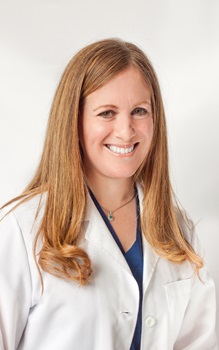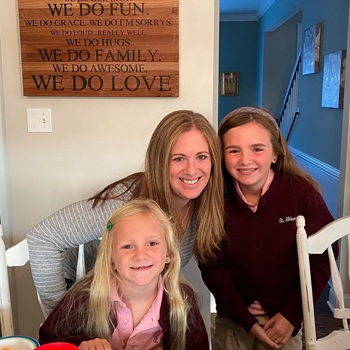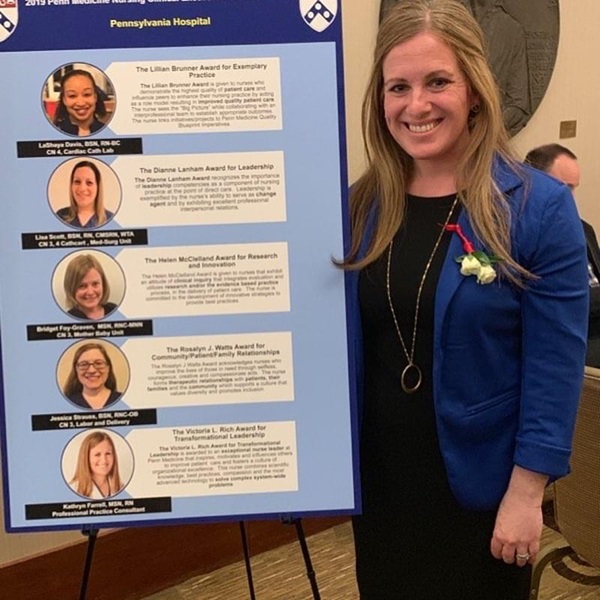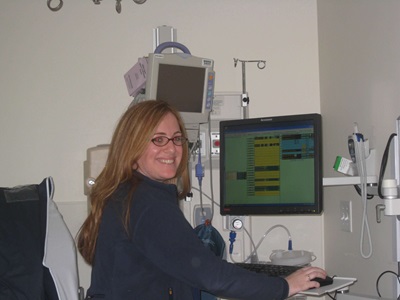The Dual Roles of Katie Farrell
June 9, 2021

Kathryn (Katie) Farrell, MSN has two roles at Drexel University; she is a full-time assistant clinical professor in the College of Nursing and Health Professions and track director of the Quality, Safety, Risk Management MSN program, and she is a student pursuing a Doctor of Education through Drexel’s School of Education.
With a BSN from Georgetown University, Farrell went to work clinically first in New York, then in Philadelphia when she decided to pursue a master's degree in health leadership with a teaching certificate from the University of Pennsylvania. “I like teaching nurses on the unit, but I found my passion in quality and safety,” shared Farrell. This allowed her to go beyond nursing education to improving nursing practice. After switching to a role more focused on quality and safety, Drexel, having just started the MSN program in quality, safety risk management, asked Farrell to teach as an adjunct professor. “I loved teaching nurses in the practice setting, but I really did like the more traditional classroom learning environment,” she said. When the track director and a full time assistant clinical professor position became available, she was thrilled for a full-time position teaching at Drexel.
We interviewed Farrell to find out more about the doctorate program and how it may influence her as a professor.
Why did you choose the nurse educator program, and Drexel’s in particular?
 I always planned to get my doctorate degree—it is a priority here at Drexel—however, I wasn't sure if I wanted a doctorate in nursing practice, a PhD or an EdD. I want to excel as a professor eventually becoming a certified nurse educator. When I found out that there was the EdD with a nursing education track, it really aligned with my current and long-term goals. It is such a unique program. It is interdisciplinary; taught in the School of Education by their faculty while my core classes will be taught by nursing faculty. Something else I really like is the varied perspectives in education I’m seeing. In my cohort there are military leaders, high school and grade school teachers all with different experiences and philosophies.
I always planned to get my doctorate degree—it is a priority here at Drexel—however, I wasn't sure if I wanted a doctorate in nursing practice, a PhD or an EdD. I want to excel as a professor eventually becoming a certified nurse educator. When I found out that there was the EdD with a nursing education track, it really aligned with my current and long-term goals. It is such a unique program. It is interdisciplinary; taught in the School of Education by their faculty while my core classes will be taught by nursing faculty. Something else I really like is the varied perspectives in education I’m seeing. In my cohort there are military leaders, high school and grade school teachers all with different experiences and philosophies.
As a faculty member, I have a unique understanding of our curriculum, expectations of students and faculty—the rigor of a Drexel education. As a student, I knew how great the program would be and how supportive the faculty are. The online format is perfect, because I have two children and a full-time job. Drexel has such great energy and such a good reputation. Why would I choose any other institution.
As a faculty member, what inspires you about Drexel students?
My students, who are all online, are so engaged. They take the time to get to know one another, they're involved in the classes and you can see their determination to succeed and to make sure everyone else does too. I've been so impressed with the caliber of our students—they are clinical experts in their professional lives, yet in the classroom, they are responsive, inquisitive and think outside the box. I think it speaks volumes of the program, as does seeing how many students continue to come back to Drexel after completing their undergraduate degree here. Because Drexel's reputation is so remarkable, students from all over the country choose to come here. That's really one of the reasons that I chose Drexel for my doctorate.
What is your favorite class to teach?
It's a tossup. I love teaching Quality and Safety in Health Care, a core class. When they come into it, some of the students think, because they are not in the quality, safety risk management track, it does not apply to them. I love watching their mind completely change to see its value for everyone, not just the risk management employee or the safety officer.
The other class I love teaching is in the track—Creating a Culture of Safety. This is our on-campus intensive course where they take everything they learned throughout the program and apply it to the simulation. Investigating adverse events, doing presentations to the board, looking at root cause analyses with real patients and real employees; it is a lot of high stress. The safe environment of a simulation lab allows students to practice before they do it in the real world.
The cohort really gels during this course. They already ‘get’ each other because they have been working together this whole time online but enjoy getting a little closer through these two long days. That’s something else I love about teaching this course.
Do you have a mission statement?
 My mission right now is to develop and grow our future nurses and nurse leaders. Nurses are retiring and I don't know if we have the same amount entering the field, so I think it is critical to make sure that we're nurturing and supporting those who do and those who continue their educations so they can give the best care to their patients. Everything I do in the classroom goes back to patients. When my students talk about projects they are doing, I'm thinking and asking, ‘okay well how's this going to impact care and the patient?’
My mission right now is to develop and grow our future nurses and nurse leaders. Nurses are retiring and I don't know if we have the same amount entering the field, so I think it is critical to make sure that we're nurturing and supporting those who do and those who continue their educations so they can give the best care to their patients. Everything I do in the classroom goes back to patients. When my students talk about projects they are doing, I'm thinking and asking, ‘okay well how's this going to impact care and the patient?’
I hope to inspire students about the importance of and the innovative approaches to improving quality and safety. I also want to impress upon them that everyone in the hospital has this responsibility—it is not just for those in a specific department.
What advice could you give to a person deciding on a healthcare path?
Do things that are uncomfortable. I think you find out where your passion lies when you try new things. This is a field that offers so many opportunities to be happy and fulfilled. If you like an area and want to stay there for your entire career, that’s great. But you can also move around a lot until you find where your heart is. Being a nurse is really the most rewarding, fulfilling job. You know every day you are making a difference; whether you're at the bedside or not, you're making a difference.
When I was working as a nurse, I loved being the charge nurse because I was helping to support everyone on the unit. I also loved precepting—that was a time where I was able to teach and mentor new nurses. That is when realized I wanted to do nursing education. Even though I am not the one holding a patient’s hand, I am still touching their lives and still engaged in clinical care. Nurses are very special people, they're not everyday people. They are passionate about something bigger than themselves and to me that is just so admirable.
